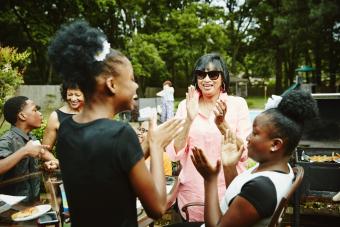
If you have an upcoming parent-child family event, such as a camping trip, brunch with extended family, or a barbecue, warm up the gang with a fun icebreaker activity. These games promote group participation and allow families a chance to get to know one another better. Choose from several types of parent-child icebreaker games that children, teens, young adults and parents will all enjoy.
Getting to Know You
Before the event, ask the parents and children (young or adult) to complete a questionnaire about each other. At the event, they read the answers aloud to the group. Some examples of questions include, "What's your parent's/child's favorite store?" and "What's your parent's favorite thing to do at home?" Young children's answers to these icebreaker questions can be very entertaining. If the event consists of teenagers and their parents, ask more advanced questions to learn something new about each other. For example, ask the parents, "Who is your teen's favorite musician?" and "What country does your teen dream of visiting?" Ask the teens, "What's your parent's favorite holiday (or season)?" or "What did your parent want to be when they grew up?"
Egg Toss
The egg toss is a physical game that is perfect for an outdoor parent-child event, such as a picnic. Line up the parents and children facing each other in parallel rows. They start by standing only a foot apart and back up a step after passing the egg back and forth. The winning parent-child team is the one that can throw the egg back and forth the longest without accidentally breaking it.
Famous Mothers
If your event features mothers with their children, play an icebreaker about famous mothers. The famous mothers can be real or fictional and may include famous women like Mother Teresa or characters such as Mother Goose. Write down the names of the mothers on small note cards. Tape the cards to the participants' backs without telling them who they have. They must ask the other participants to give them clues about the name on their backs to determine their identity.

Pass the Ball
This game requires small groups of people. If you have a large group of parents and children, break the group up into smaller, more manageable groups. Each group gets one large beach ball. The beach ball has tons of general "get to know you" questions written on it. Examples of questions might include:
- What is your favorite sport?
- Where were you born?
- Where was your favorite vacation?
- Who was your favorite teacher?
- What is your favorite and least favorite food?
Kids and parents toss the ball to people in their group. The person catching the ball answers the closest question to their right or left thumb (whichever thumb gets decided on). Even young children who cannot yet read proficiently can get help from adults in the group and answer the general questions.
Handful of Candy
When parents and children are first seated at the event, pass around a bowl of small candies such as M&M's. Tell the group to take a handful, but wait to eat the candy until given further instructions. After the bowl has been passed around the room, tell them that they must state one fact about their parent/child for each piece of candy in their hands. Examples of facts may include, "My dad is an accountant," or "My daughter plays the flute." Participants who grabbed a large handful of candy must state lots of facts, so it can be funny for the other participants. If the event is outdoors, such as a parent-child campout or a family reunion retreat, pass around toilet paper instead. Tell everyone, "Take as much as you need" to start the game. Participants must state one fact per square of toilet paper.

Animal Mama and Baby Game
Everyone in your gathering gets a random slip of paper. On each slip of paper, the name of a mother animal or a baby animal is written. Examples of animal parent-child pairs might include:
- Goose and gosling
- Duck and duckling
- Bear and cub
- Fox and kit
The people in the group must then move about looking for their matching animal. Once everyone has found the parent or child animal that pairs with them, they greet each other and say hello.
Line It Up
Break your gathering up into groups of six. Be sure to include a mix of adults and children. Each group assigns a caller. The caller then calls out orders of lining up! They might choose to tell their group to:
- Line up from shortest to tallest
- Line up from youngest to oldest
- Line up in alphabetical order
- Line up according to birthday month (with January 1st being the start of the birthdays)
- Line up starting with the person with the shortest hair to the longest hair
The people playing have to communicate with each other while they are figuring out how to fashion the lines via the directions they are given.

Two Truths and a Lie
Get ready for giggles and smiles. Two truths and a lie is a great ice-breaking game to play with older children and adults. Everyone gathers and takes turns sharing two truths about themselves, as well as one lie. People vote on what they think is the lie. When a child is taking a turn with two truths and a lie, that child's parent is automatically out, as they will be able to spot the lie easily. This is a great way to learn interesting facts about the people in your family.
Choosing the Icebreaker
Gathering in larger groups can sometimes feel impersonal. Playing easy, fun icebreaker games and activities is an excellent way to bond and have more personal conversations and interactions.







